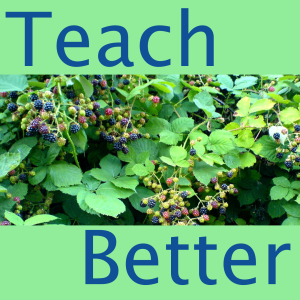
Edward and Doug discuss several low-tech alternatives to technology products they’ve discussed in earlier episodes of #edtechsummer. Laminated color-coded cards and Plickers let you poll your class without any student-held electronics. Atiyeh Showrai joins us from the USC French language program to talk about their experience creating an e-workbook using just Microsoft Word and Adobe Acrobat. Then Quirine Ketterings (Cornell) shares the role-play game she plays at the end of term in her Whole Farm Nutrient Management class.
You can subscribe to the Teach Better Podcast through your favorite podcast app or simply subscribe through iTunes if you don’t have one yet.
Show Notes0:00 ⏯ Intro
0:30 ⏯ Edtech Summer winds down.
4:25 ⏯ Some corrections and follow-through about economic games. It’s “economics-games.com” with two s’s, not “economic-games.com”. MobLab will help you randomly select a student to reward at the end of a game.
7:02 ⏯ Normalizing wrong answers. Pros and cons of low-tech alternatives to clickers: Hand-raising, letter cards, and Plickers.
15:17 ⏯ Atiyeh Showrai: French language faculty create their own e-workbook. Addressing student issues by bringing together learning activities around Camus’ novel The Stranger. Reducing ‘paper management’ issues. Using Microsoft Word and Adobe Acrobat.
23:30 ⏯ How the project changed over five years. Students became less enamored of printing pages. The digital version works best on a tablet.
28:47 ⏯ Combining a printed workbook with a customized publishing-on-demand textbook. “There isn’t one perfect answer.”
32:03 ⏯ Keeping costs down, meeting students’ needs, and being nimble.
38:06 ⏯ What good ed tech service does. When you should create your own digital textbook.
45:59 ⏯ Games and in-class simulations: Lynn Regan’s vendors and clients game.
48:28 ⏯ Quirine Ketterings teaches Nutrient Management. Students may actually manage a farm when they graduate. Thinking about the the bottom line and sustainability.
52:23 ⏯ The stakeholders in the farm-as-a-system.
56:10 ⏯ The actual in-class activity. Groups, roles, challenges. Preparing a case and using a debate format with a moderator.
1:03:10 ⏯ The closure at the end, and how students experience the exercise.
1:06:51 ⏯ When Doug did in-class simluations.
1:09:04 ⏯ Creating memorable moments in chemistry classes: Humans acting out gene expression with Clay Clark (U Texas, Arlington) and simulating enzyme catalytics with Matt Junker (Kutztown University).
1:09:49 ⏯ Previewing our next episode: the Future of Ed Tech.
1:11:07 ⏯ Signing off.
More Episodes
Create your
podcast in
minutes
- Full-featured podcast site
- Unlimited storage and bandwidth
- Comprehensive podcast stats
- Distribute to Apple Podcasts, Spotify, and more
- Make money with your podcast
It is Free
- Privacy Policy
- Cookie Policy
- Terms of Use
- Consent Preferences
- Copyright © 2015-2024 Podbean.com






